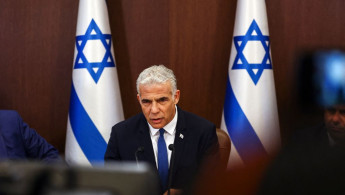Israel approves 1,446 new settlement units south of Jerusalem
The Israeli "Jerusalem District Planning Committee" approved the building of 1,446 new settlement units southeast of Jerusalem on Tuesday, which the committee had been discussing previously.
The plan extends control over the lands of the Palestinian town of Sur Baher, expanding the Israeli settlement of the "Lower Aqueduct", located on an old Roman aqueduct that provided Jerusalem with water in antiquity.
"The plan is not new, as it had been discussed at least since December," Khalil Tafakji, a leading Palestinian expert on Israeli settlement in Jerusalem, told The New Arab. "The approval's announcement was to be earlier, but Israel probably wanted to wait until Joe Biden's visit to the country was over."
The District Planning Committee discussed the Givat Hashaked plan today. Plan that will take over the last piece of land left for the development of Beit Safafa. 750 units. Later today the Lower Aqueduct plan will be discussed. pic.twitter.com/y2s6FB09SX
— Hagit Ofran חגית עופרן (@hagitofran) July 25, 2022
"These new settlement housing units would extend the settlement on the 'Lower Aqueduct' in Jerusalem's southeast to connect with the "Ramat Hamatos" settlement in the city's southwest," noted Tafakji.
"This would seal off the south of Jerusalem and isolate it from its natural extension in northern Bethlehem," he added. "It also follows the Israeli plan of increasing Jerusalem's Jewish population to reach an 88% Jewish majority," he said.
Israel's "Jerusalem Master Plan 202"0 explicitly states the goal of ensuring a Jewish majority in Jerusalem.
After being removed from the Jerusalem District Planning Committee’s July 18 agenda due to US President Biden’s visit to the region, the plans for 2 new settlements in EJ: Givat Hashaked and the Lower Aqueduct, were rescheduled for discussion yesterday. 🧵1/ pic.twitter.com/kMBrZx9f36
— Ir Amim English (@IrAmimAlerts) July 26, 2022
Earlier in May, Israel approved around 1,600 new settlement units in the French Hill settlement, east of Jerusalem, including touristic resort facilities and student dorms.
In February, Israel approved some 400 settlement units in the Har Homa settlement on Mount Abu Ghneim, north of Bethlehem.





 Follow the Middle East's top stories in English at The New Arab on Google News
Follow the Middle East's top stories in English at The New Arab on Google News


